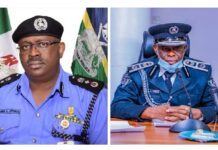 “Nigeria has learnt nothing from its long and chequered train of electoral woes. Nigeria has a very unusually queer habit of ignoring historical antecedents and facing the future blindly having learnt nothing from her past mistakes.” Ben Nanaghan
“Nigeria has learnt nothing from its long and chequered train of electoral woes. Nigeria has a very unusually queer habit of ignoring historical antecedents and facing the future blindly having learnt nothing from her past mistakes.” Ben Nanaghan
It is clichéd now to say that Nigerians deserve the leaders they have. And though less than 1% of Nigerians have had the opportunity to steer the ship, it is also now trite to blame Nigerians and the dismal state of affairs on our peculiarities and proclivities. A lot of attention has been paid to culture, tradition, professed love of God/Allah/Ifa/Amadioha, and ethnic pride as the reasons why Nigerians have been unable to cash in on their collective potential as a nation.
For many, our problems are linked to what could be described as accidents of chance: the culture and tradition of our societies and communities; ethnicity; gender; and evenreligion (except for the handful who make the extremely mindful decision to leave the religion they were born into). Yet these accidents of chance have an iron-clad grip on our reason and frame the way we view our world and explain our lives. If this is true, then it is unfortunate that there hasn’t been any real effort since 1914 to create a common frame through which Nigerians’ can stare at themselves and the rest of the world.
As we struggle to hold things together as things pull apart even further from the center, especially since many think the 2015 elections will mark a watershed in our history, now is as good a time as any to try to find an opening to relive the burden of the frames we use. The motions and words of key actors in our history and self appointed gatekeepers to our future dictate that even though ‘emotion is Negro and reason is Greek’, we begin break out of the shackles of our frames by latching on to things that we seem to be pointedly ignoring: remembrance (of things past) and truth.
Elections are the most legitimate means available to us to deal maturely and sensibly with most of our problems yet free and fair elections have been denied us since the elections which ushered in those who took over from the British in 1960. As Nigerian civil society organisations and good governance advocates focus on reforming the 1999 Constitution and the 2010 Electoral Act, the old guard politicians are working as well to ensure that nothing changes and their interests remain protected. One such person, whether or not Nigerians insist on being ruled by emotion, is President Olusegun Obasanjo who personifies everything our collective remembrance should reject.
As President Obasanjo is a daily staple in our consciousness via the media – talking about the current administration’s track record on corruption and the (mis)managment of the insecurity related to Jamā’atu Ahlis Sunnah Lādda’awatih wal-Jihadand the Joint Task Force; agreeing that politiciansand political parties are responsible for our current situation and allegedly making plans for 2015 – having not-so-secret meetings all over the place, it is necessary to ask why anyone is still listening to him and why Nigerians are not suspicious about his involvement in influencing government and the electoral process?
Nigerians must have the memory encoding capacity of gnats. It is either this, or it is the explanation provided by Calvin Candie (Leonardo DiCaprio’s character in Django Unchained). Monsieur Candie believes members of the Negro race are pre-programmed for servility and submissiveness. Otherwise, several words closely associated with President Obasanjo should be enough to ensure that each time his name is mentioned, all well meaning Nigerians have a violent physical reaction such as debilitating nausea. Anambra, Ngige, Third Term, ‘Ooomaru’, and do-or-die are just a few. What these words invoke should be sufficient for Nigerians to not only reject anything President Obasanjo has to say but also reject those he ‘anoints’ as candidates for any election. And if these words do not evoke anything – pick up ‘Counting the Cost: Nigerian Elections in Perspective’ by Adewale Maja-Pearce.
//////////////////////////////////
“Nigerians must have the memory encoding capacity of gnats. It is either this, or it is the explanation provided by Calvin Candie (Leonardo DiCaprio’s character in Django Unchained). Monsieur Candie believes members of the Negro race are pre-programmed for servility and submissiveness.”
////////////////////////////////////
President Obasanjo’s attempt to become the Mugabe of Nigeria are well documented even if he continues to deny his involvement. The deliberate attempt to destabilize Anambra, culminating in the three-day attack where government buildings were burnt while the police fiddled and Obasanjo’s Aso Rock maintained a stately silence are also chronicled and his role in ramming President Yar’adua and by default, President Jonathan down our throats have become engrained in our political history…and yet.
Yet, this man continues to meddle in Nigeria’s affairs even when remembering our very recent history and merely telling the truth about his involvement (and the involvement of many) should be enough to pierce the logic destroying frames of ethnicity, culture, religion and gender. Granted, whatever strides the nation made under President Obasanjo during his eight-year term may not be open to debate but his bad influence on our politics and electoral process is not debatable.
And that is the trouble with us…despite the generosity of our political elite in terms of scandalous fodder for our canons of disdain, we will not let our history and the truth set us free from our chance frames. Just last week, President Obasanjo was reported as saying “One of
the things we must look into in people we put in position of authority at whatever level is their integrity and character.” The phrase ‘we put in” says it all about his frame of reference for those who find themselves in positions of stewardship in Nigeria. If we refuse to free ourselves of the meddling of people like President Obasanjo despite what history tells us, then let us think seriously about what he said about integrity and character – and remove all the frames of
reference by which we analyse these things (ethnicity, religion, subservience) and pare everything down to what the facts tell us…the current political actors, producers and directors i.e., the ‘same old politicians who ruled Nigeria before’ as Fela puts it, must not be trusted.



